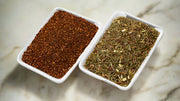Top 10 Facts About Tea (Steeping Facts From Myths)

For thousands of years, tea has been cherished as both a ritual and a remedy. Yet despite its long history, myths and misconceptions continue to swirl around this ancient beverage. Some myths are harmless quirks, while others can actually stop tea drinkers from enjoying the full potential of their cup.
In this guide, we’ll separate fun fact about tea from fiction by tackling the Top 10 Facts About Tea vs Myths. Whether you’re new to tea or a seasoned sipper, you might be surprised at what you learn.
1. Myth: All teas are caffeine-free
Fact: Only herbal teas are naturally caffeine-free.
Tea leaves that come from the Camellia sinensis plant—green, black, oolong, and white—naturally contains caffeine. However, the amount is usually far less than coffee.
For instance, a cup of black tea typically has about 40–60 mg of caffeine compared to coffee’s 95–120 mg. Herbal blends like chamomile, rooibos, or peppermint are the go-to options if you want a naturally caffeine-free cup of tea.

2. Myth: Adding lemon destroys antioxidants
Fact: Lemon can actually boost antioxidant absorption.
A common belief is that citrus “kills” the health benefits of tea. In reality, adding lemon may enhance the bioavailability of catechins (antioxidants found in green tea). The vitamin C helps your body absorb them more effectively. So go ahead—add that splash of lemon for both flavor and function.
3. Myth: Herbal teas aren’t “real” tea
Fact: Herbal teas (tisanes) are tea in their own right.
While true tea comes from the Camellia sinensis tea plant, herbal teas—or tisanes—have been brewed for centuries for wellness and enjoyment. Hibiscus, peppermint, ginger, and chamomile are beloved worldwide and bring their own unique benefits, from digestive support to relaxation. They may not technically be “true tea,” but they are still "real", and a valuable part of tea culture.

4. Myth: Honey should only be added to boiling-hot tea
Fact: Honey is best added to warm—not boiling—tea.
It’s tempting to stir honey into a steaming mug, but very high heat can damage its natural enzymes and reduce some of its nutritional value.
The best practice is to let your tea cool slightly (around 140°F / 60°C) before adding honey. This way you preserve its delicate compounds while still enjoying its sweetness.
5. Myth: The longer you steep, the better the tea
Fact: Over-steeping can make tea bitter.
Leaving your tea bag or infuser in the cup doesn’t necessarily give you more flavor—it often leads to bitterness. Green tea typically shines after just 2–3 minutes, black tea after 3–5 minutes, while herbal teas can steep longer without harm. Stick to recommended steep times for a balanced, enjoyable brew.

6. Myth: Green tea is the only healthy tea
Fact: Every type of tea has unique health benefits.
Green tea often takes the spotlight thanks to its antioxidant profile, but it’s not the only tea worth drinking for wellness. Black tea may support heart health, oolong tea is linked to metabolism and weight management, white tea is known for anti-aging antioxidants, and herbal blends offer relaxation, digestive support, and more. The healthiest tea is the one that fits your lifestyle and tastes.
7. Myth: Loose leaf and bagged tea are the same
Fact: Loose leaf generally offers higher quality and fresher flavor.
While tea bags are convenient, they’re often filled with “fannings” or “dust”—small broken tea particles that can lose flavor quickly. Loose leaf tea usually consists of larger, intact leaves that release more nuanced aromas and taste. That said, high-quality bagged teas do exist, but loose leaf is often the better option if you’re after freshness and complexity.
8. Myth: Iced tea has no health benefits
Fact: Iced and cold-brewed tea retain antioxidants too.
Some people believe health benefits vanish when tea is served cold. The truth is that antioxidants remain in your brew whether it’s hot or iced. In fact, cold-brewing can reduce bitterness and yield a naturally sweeter, smoother cup. It’s a refreshing way to enjoy tea—without sacrificing its healthful compounds.

9. Myth: Tea dehydrates you
Fact: The mild caffeine in tea has a very small diuretic effect, but tea is still hydrating overall. Herbal teas that don’t contain caffeine hydrate the body much like plain water.
Even teas with small amounts of caffeine—like green or black—still provide a net positive hydration effect, since the water content outweighs caffeine’s mild diuretic impact.
So yes, sipping herbal tea counts toward your daily fluid intake—a delicious alternative to water.
10. Myth: Boiling water works for every tea
Fact: Different teas need different water temperatures.
Using boiling water on green or white tea can burn the leaves, resulting in a bitter brew. These delicate teas prefer cooler water (160–185°F). Black and herbal teas, however, can handle water at a full boil (200–212°F). Paying attention to water temperature is one of the simplest ways to elevate your tea game.

Bonus Myth: Tea never expires
Fact: Tea can lose flavor and aroma over time.
Exposure to air, light, and humidity can dull the flavor and reduce the beneficial compounds. While properly stored tea won’t exactly “go bad” like milk or bread, it does have a shelf life.
But don't worry, it is a long one.
Most teas stay fresh for about 1–2 years if stored in an airtight container, away from heat and sunlight. Herbal blends may fade faster. For the best taste, drink your tea while it’s still vibrant and fragrant.
Final Sip
Tea is more than just a drink—it’s a culture, a ritual, and a source of wellness. But enjoying it to the fullest means letting go of outdated myths. From caffeine content to brewing tips, these tea facts prove there’s always more to learn in your teacup.
The next time you brew, you’ll know the truth—and every sip will taste even better.






